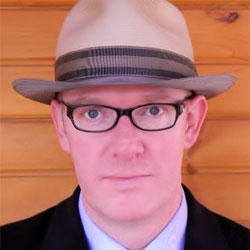In the Museum of Death the guests are eating lunch
made from a dead man’s recipe.
They use knives and forks invented by the dead.
Everyone sits in a room
built by those who are no longer with us,
everyone speaking words the dead have made.
Everything is archaeological:
prayer, toilets, table manners, cash.
Even the air was once breathed by the dead.
Look how impatiently the curator taps
his fingers on his desk. It’s getting late.
Very soon the guests will have to go.
Notes on the Poem
In "The Museum of Death", James Pollock's narrator points out with matter-of-fact elegance some things about which some group of people might not be aware. But is it clear who the voice is addressing, why he's addressing them and what he thinks of them? On first reference, those unaware folks are called "the guests". Wherever and whatever the Museum of Death is, these individuals have been invited to experience it, dine within it and possibly learn something while visiting it. But when, in the second stanza, the narrator mentions "those who are no longer with us", is he using a standard euphemism or is he including all of in the group of guests who aren't aware or don't seem to appreciate their predecessors, the creators of such marvels as recipes, cutlery, language and more as we continue through this brief, crisp poem? Who, then, is the curator? Is he impatient simply because it's late or perhaps because this group is so wilfully ignorant? The narrator seems to concur with the finger-tapping curator that the guests don't deserve to remain and enjoy what has been curated for them. That they (us?) "will have to go" sounds both profoundly annoyed and possibly ominous.
